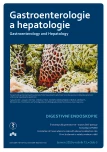Metastasis to the stomach and duodenum as an unusual cause of acute bleeding in the upper gastrointestinal tract
Authors:
Farská L. 1; Rychtařík M. 2; Řeřábek M. 3
Authors‘ workplace:
Gastroenterologické oddělení, Nemocnice České Budějovice, a. s.
1; Radiologické oddělení, Nemocnice České Budějovice, a. s.
2; Patologické oddělení, Nemocnice České Budějovice, a. s.
3
Published in:
Gastroent Hepatol 2019; 73(3): 243-249
Category:
Gastrointestinal Oncology: Case Report
doi:
https://doi.org/10.14735/amgh2019243
Overview
Bleeding in the upper digestive tract is one of the most serious conditions in gastroenterology and is associated with relatively high mortality. Although endoscopic techniques have rapidly developed, this bleeding requires fast and accurate diagnosis together with rapid and effective treatment, which necessitates the collaboration of gastroenterologists and surgeons. There are many causes of gastrointestinal bleeding. Malignant lesions are responsible in only a small percentage of cases. Metastases to the upper gastrointestinal tract from distant organs are rare and consequently often represent an advanced stage of malignancy. Clinical cases of metastasis to the upper gastrointestinal tract are highly nonspecific and endoscopic imaging is often heterogeneous. Lung, breast, and renal carcinomas most often metastasize to the stomach, while melanoma and lung, renal, cervical, and thyroid carcinomas can metastasize to the duodenum. This study describes two cases with this rare cause of acute bleeding in the upper gastrointestinal tract. The first case was a patient with metastasis of breast cancer to the stomach fornix. In the second case, metastasis of renal carcinoma to the duodenum via the head of the pancreas was the source of acute bleeding in the upper digestive tract. Treatment of metastatic tumors in the stomach and duodenum is palliative in most cases, depends on the overall condition of the patient and the type of primary carcinoma, and consists of various combinations of endoscopic, radiological, surgical, and oncological interventions.
Keywords:
metastasis – gastrointestinal bleeding – Stomach – duodenum – renal carcinoma
Sources
1. Zavoral M, Mařatka Z. Krvácení do trávicího ústrojí. In: Mařatka Z et al. Gastroenterologie. Praha: Karolinum 1999: 435–446.
2. Husová L, Dítě P, Husa P et al. Akutní krvácení do horní části trávicí trubice – diagnostika. Interní Med 2001; 3(1): 19–21.
3. Konečný M, Procházka V. Racionální diagnostický a terapeutický postup u akutního krvácení do horní části trávicího traktu. Interní Med 2009; 11(10): 446–448.
4. Machytka E, Svoboda P, Martínek A et al. Incidence krvácení do horní části zažívacího traktu v regionu Ostrava-Poruba v letech 2002–2005. Čes a Slov Gastroent a Hepatol 2007; 61(3): 124–128.
5. Dítě P, Novotný I, Kroupa R et al. Akutní nevarikózní krvácení do horní části trávicího traktu. Čes a Slov Gastroent a Hepatol 2007; 61(1): 6–10.
6. Tham TC, Allen PB. Krvácení do horní části gastrointestinálneho traktu. In: Tham TC, Collins JS, Soetikno R. Urgentní gastroenterologie.
3. vyd. Praha: Grada 2017: 14–23.
7. Cherian SV, Das S, Garcha AS et al. Recurrent renal cell cancer presenting as gastrointestinal bleed. World J Gastrointest Oncol 2011; 3(6): 99–102. doi: 10.4251/ wjgo.v3.i6.99.
8. Bhatia A, Das A, Kumar Y et al. Renal cell carcinoma metastasizing to duodenum: a rare occurrence. Diagnostic Pathology 2016. [online]. Available from: https:/ / diagnostic-pathology.biomedcentral.com/ articles/ 10.1186/
1746-1596-1-29.
9. Iwamuro M, Uetsuka H, Makihata K et al. Metastatic tumors in the duodenum: a report of two cases. J Can Res Ther 2015. [online]. Available from: http:/ / www.cancerjournal.net/ text.asp?2015/ 11/ 3/ 648/ 137675.
10. Singh A, Nazeer H, Thakur K et al. Upper gastrointestinal bleeding as a manifestation of metastasis from laryngeal cancer. ACG Case Rep J 2015; 2(3): 155–157. doi: 10.14309/ crj.2015.39.
11. Weigt J, Malfertheiner P. Metastatic disease in the stomach. Gastrointest Tumors 2015; 2(2): 61–64. doi: 10.1159/ 000431304.
12. De Palma GD, Masone S, Rega M et al. Metastatic tumors to the stomach: clinical and endoscopic features. World J Gastroenterol 2006; 12(45): 7326–7328. doi: 10.3748/ wjg.v12.i45.7326.
13. Kim GH, Ahn JY, Jung HY et al. Clinical and endoscopic features of metastatic tumors in the stomach. Gut Liver 2015; 9(5): 615–622. doi: 10.5009/ gnl14032.
14. Hohenberger W, Hornbach TH. Paliativní léčba – podpůrné metody. In: Becker HD, Hohenberger W, Junginger T et al. Chirurgická onkologie. 1 vyd. Praha: Grada 2005: 41–48.
Labels
Paediatric gastroenterology Gastroenterology and hepatology SurgeryArticle was published in
Gastroenterology and Hepatology

2019 Issue 3
- Metamizole vs. Tramadol in Postoperative Analgesia
- Metamizole at a Glance and in Practice – Effective Non-Opioid Analgesic for All Ages
- Possibilities of Using Metamizole in the Treatment of Acute Primary Headaches
- Current Insights into the Antispasmodic and Analgesic Effects of Metamizole on the Gastrointestinal Tract
- Spasmolytic Effect of Metamizole
Most read in this issue
- Acute complications of hiatal hernias
- Interesting endoscopic image of MALT lymphoma of the stomach
- Heme iron in substitution of sideropenia and sideropenic anemia
- Renal complications of acute and chronic liver disease
